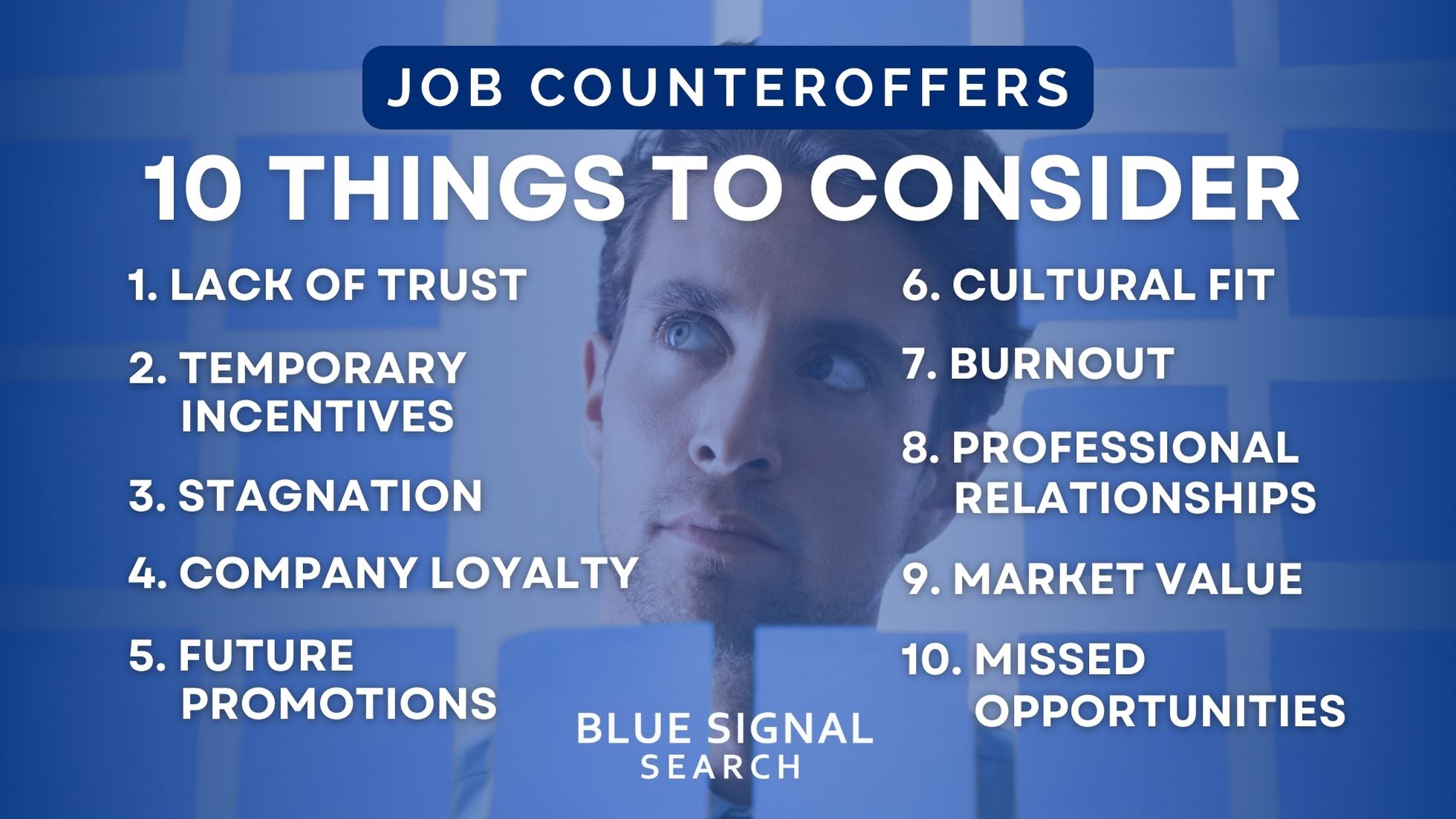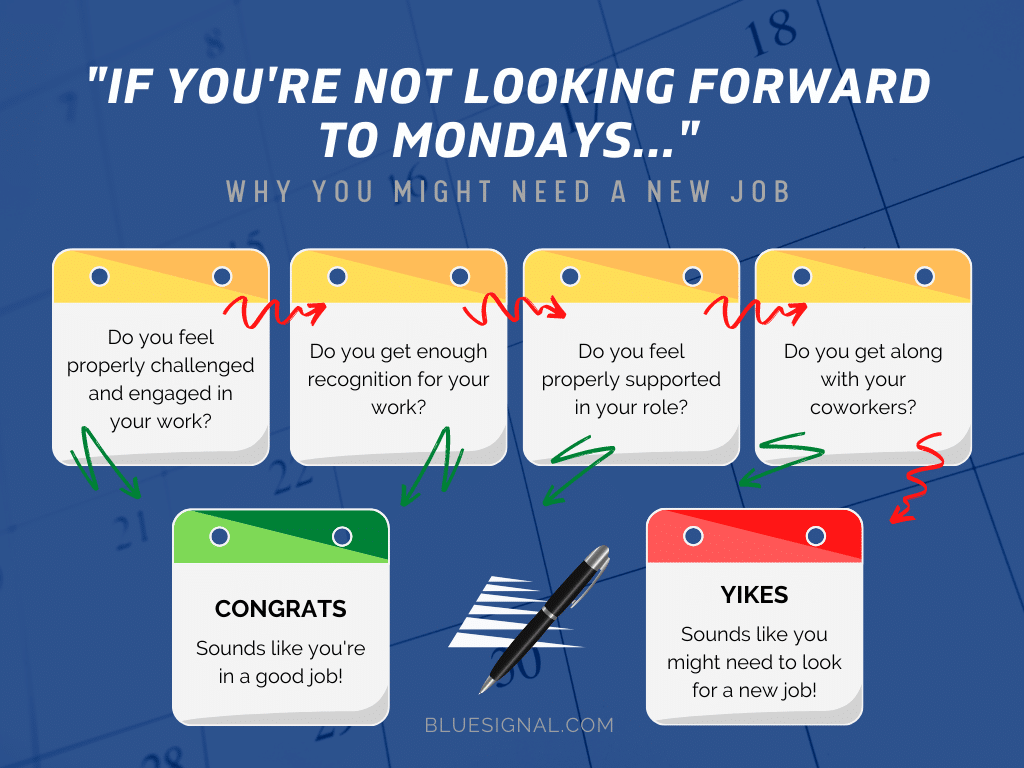In today's competitive job market, job counteroffers have become increasingly common. Whether you're a job seeker actively looking for new opportunities or an employed professional considering a career move, it's crucial to recognize the significance of making informed decisions during these critical transitions. At Blue Signal, our recruiting firm's expertise lies in helping professionals like you navigate these complexities, and in this blog, we'll explore 10 reasons to think twice about your next career move.
The Allure of Job Counteroffers
First and foremost, the allure of a job counteroffer is undeniable. It often includes enticing components such as a salary increase, improved benefits, and sometimes even promises of a brighter future within the company. Forbes insightfully describes the dynamics of career transitions as a 'push' and a 'pull.' The 'push' signifies the dissatisfaction or unmet goals in one's present role, while the 'pull' is the allure of something new. Job counteroffers embody this 'pull,' offering attractive incentives like salary hikes and a brighter professional future. These offers are strategically designed to make you reconsider your decision to leave your current employer. While the immediate gratification of a counteroffer may be appealing, it's essential to take a closer look at the potential long-term consequences.
As you navigate the intricacies of job counteroffers, another challenge might present itself: managing multiple job offers. While it's a testament to your skills and qualifications, making the right choice among several offers can be daunting. To aid in this process, our partners at Resume and Career Services have crafted a comprehensive video guide on the art of handling multiple job offers.

Reason 1: Lack of Trust
To begin with, one of the primary reasons to think twice before accepting a counteroffer is the potential erosion of trust. When you receive a counteroffer only after announcing your intention to leave, it raises questions about your employer's true appreciation and commitment to your professional growth. Accepting such an offer may lead to lingering doubts about your value within the organization.
Reason 2: Temporary Incentives
Additionally, temporary incentives, such as a short-term salary bump or a bonus, may seem attractive at first glance. They can provide immediate financial relief and tempt you to stay with your current employer. However, it's essential to recognize that these incentives often fail to address the underlying issues that prompted your job search in the first place. Accepting a counteroffer for these temporary perks might not lead to long-term job satisfaction.
Reason 3: Stagnation
Furthermore, stagnation is another critical factor to consider when evaluating a job counteroffer. It may limit your exposure to broader experiences and stunt your long-term career growth. You may find yourself stuck in a position that no longer challenges or fulfills you, ultimately hindering your professional development.
Reason 4: Company Loyalty
Moving forward, balancing company loyalty with your career goals is a delicate act. While loyalty to your current employer is admirable, it's essential to evaluate whether staying with your current employer aligns with your professional aspirations in the long run. Accepting a counteroffer solely out of loyalty may hinder your progress toward your broader career objectives.
Reason 5: Future Promotions
Additionally, your decision regarding a counteroffer can significantly impact your prospects for future promotions. Employers might question your commitment and dedication if they perceive that you were willing to leave. This perception can affect your advancement within the company and limit your access to more significant opportunities.
Reason 6: Cultural Fit
Moving on, when contemplating a job counteroffer, assessing cultural fit becomes paramount. Company culture and values profoundly impact your job satisfaction. A counteroffer may not address any misalignment between your values and those of your current employer. This misalignment could lead to ongoing dissatisfaction and discomfort in your role.
Reason 7: Burnout
Furthermore, accepting a counteroffer might not resolve the root causes of your job dissatisfaction. The underlying issues that prompted your initial job search could continue to affect your well-being and job performance, potentially leading to burnout in the long term. It's worth noting that burnout is a significant reason many employees decide to leave their positions. For a deeper dive into understanding burnout and its implications, check out our previous article on why employees quit.
Reason 8: Professional Relationships
Next, your choice regarding a counteroffer can influence your professional relationships and team dynamics within the workplace. Colleagues and superiors may perceive your decision differently, affecting the dynamics you've built over time. Managing these professional relationships effectively is essential to maintaining a positive work environment.
Reason 9: Market Value
Shifting gears, understanding your market value is crucial. Counteroffers may not always reflect your true worth in the job market. While your current employer may match or exceed external offers, it's essential to consider whether the counteroffer aligns with industry standards and your long-term career goals.

Furthermore, it's worth noting that while some people managers occasionally use counteroffers as a retention tool, there are reservations surrounding this approach according to research from the Society for Human Resource Management (SHRM). Among them, 37 percent of managers feel that extending counteroffers sets a concerning precedent, another 34 percent believe it erodes trust between employees and employers, and 30 percent see it as a factor that negatively impacts overall employee morale.
Reason 10: Missed Opportunities
Last but not least, accepting a salary counteroffer may mean missing out on potentially life-changing opportunities. It's essential to consider that the job you initially sought outside your current employer likely offered new challenges, experiences, and growth prospects. Opting for a counteroffer might keep you in your comfort zone, but it could also prevent you from exploring a more fulfilling and exciting career path elsewhere. By accepting the counteroffer, you might inadvertently close the door to a brighter and more rewarding future.
Conclusion
In conclusion, the job counteroffer dilemma is multifaceted, and it's essential to think twice before making a decision that can significantly impact your career. At Blue Signal, our expertise lies in helping professionals like you navigate these critical career choices. We invite you to explore our job board and reach out to us for guidance as you embark on your journey to a fulfilling career.
Remember, the decision to accept or decline a counteroffer should align with your long-term career goals. Make informed choices to ensure your professional growth and job satisfaction. The path you choose today will shape your future, and we're here to support you every step of the way.
About Melissa Wells
Meet Melissa Wells, an accomplished Sr. Executive Recruiter at Blue Signal. Melissa’s passion lies in helping professionals like you achieve their career aspirations. With a background in sales and recruiting, Melissa brings invaluable expertise to the realms of manufacturing, engineering, and finance & accounting recruitment. Her dedication to ensuring exceptional experiences for clients and candidates alike makes her a trusted partner on your career journey. Whether you're seeking the perfect job opportunity or the ideal addition to your team, Melissa is here to guide you towards success. Explore the possibilities with Melissa and the Blue Signal team by your side.
Partner with us for your next hire.
Set up a free consultation with a recruiting manager. Tell us about your hiring need.
By submitting this form, you consent to receive communications from Blue Signal, including phone calls, emails, and text messages.

